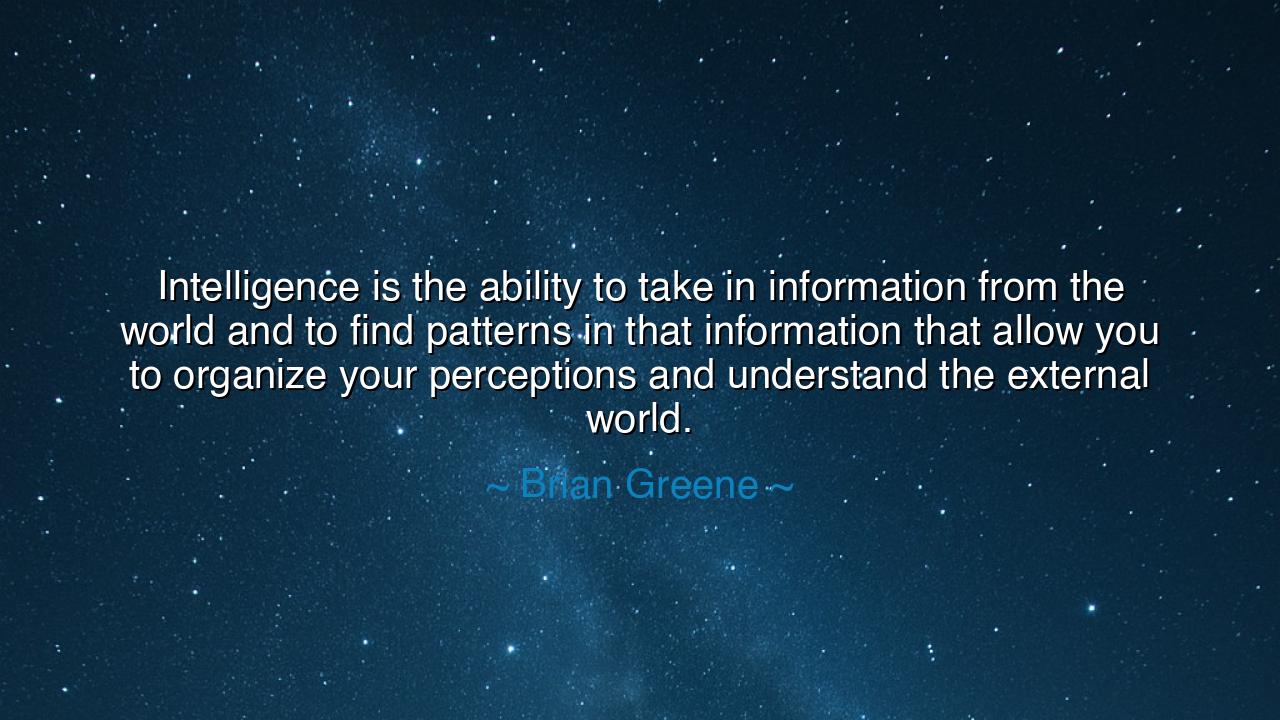
Intelligence is the ability to take in information from the world
Intelligence is the ability to take in information from the world and to find patterns in that information that allow you to organize your perceptions and understand the external world.






Hearken, seekers of wisdom, and listen to the words of Brian Greene, the physicist who has gazed into the structure of reality and seen the harmony between thought and nature: “Intelligence is the ability to take in information from the world and to find patterns in that information that allow you to organize your perceptions and understand the external world.” In this reflection lies the very essence of understanding — that true intelligence is not merely knowledge, but the power to discern order amidst chaos, to perceive hidden connections where others see only confusion.
Since the dawn of thought, the greatest minds have sought to interpret the universe not through brute memorization, but through pattern. The hunter who noticed the footprints of prey in the dust, the farmer who observed the rhythm of seasons, the sailor who read the stars — all were early masters of intelligence, translating observation into insight. Greene’s wisdom reminds us that the intellect’s highest purpose is not to collect facts, but to weave them into meaning, to transform the fragments of perception into the tapestry of comprehension.
This vision of intelligence aligns with the ancient teachings of philosophers and scientists alike. The Greek sage Pythagoras discerned that harmony in music and proportion in geometry both arose from the same mathematical principles — the patterns of nature rendered audible and visible. In recognizing this unity, he touched the divine rhythm of the cosmos. So too does Greene, in his modern understanding of physics, remind us that intelligence is not separate from the world it studies; it is the mirror by which the universe comes to know itself.
To find patterns is to uncover truth. It is what lifted humanity from instinct to reason. Consider the story of Isaac Newton, who watched an apple fall and saw in its descent the same law that governs the moon’s orbit. In that simple observation, he bridged the heavens and the earth. This was intelligence in its purest form — the capacity to perceive the hidden structure beneath the visible surface, to grasp that the universe moves by principles that can be known, predicted, and understood.
Yet Greene’s words also speak to the art of perception itself. The external world is vast and chaotic, filled with sound and motion. Without the power to organize these sensations, the mind would drown in data. Intelligence, therefore, is the act of ordering perception, of shaping experience into coherence. It is not simply to see, but to understand what is seen — to interpret the world in such a way that action, creativity, and discovery become possible.
In this light, intelligence becomes a sacred bridge between observation and understanding, between matter and meaning. The wise do not rush to judgment; they dwell in the space between perception and conclusion, searching for the pattern that reveals the truth. The artist sees beauty in form; the scientist sees logic in motion; the philosopher sees principle in paradox. Each practices the same act of intelligence — the discovery of pattern in the endless flow of experience.
From this truth arises a timeless lesson. To become intelligent is not to memorize, but to observe deeply. Train your eyes to see what others overlook; listen not only to the sound, but to the rhythm beneath it. Seek connections between disciplines, between thoughts, between lives. For in doing so, you will cultivate the kind of intelligence that transcends mere intellect — the intelligence that harmonizes with the very structure of reality.
Finally, remember that Brian Greene’s wisdom calls not only for understanding the world, but for participating in it. The universe reveals its patterns only to those who approach it with curiosity, humility, and wonder. Intelligence is both discovery and dialogue — a conversation between mind and cosmos. To live intelligently, then, is to align your perception with the truth of the world: to recognize the order within apparent disorder, and to shape your life, like the cosmos itself, in harmony with the patterns of existence.






AAdministratorAdministrator
Welcome, honored guests. Please leave a comment, we will respond soon